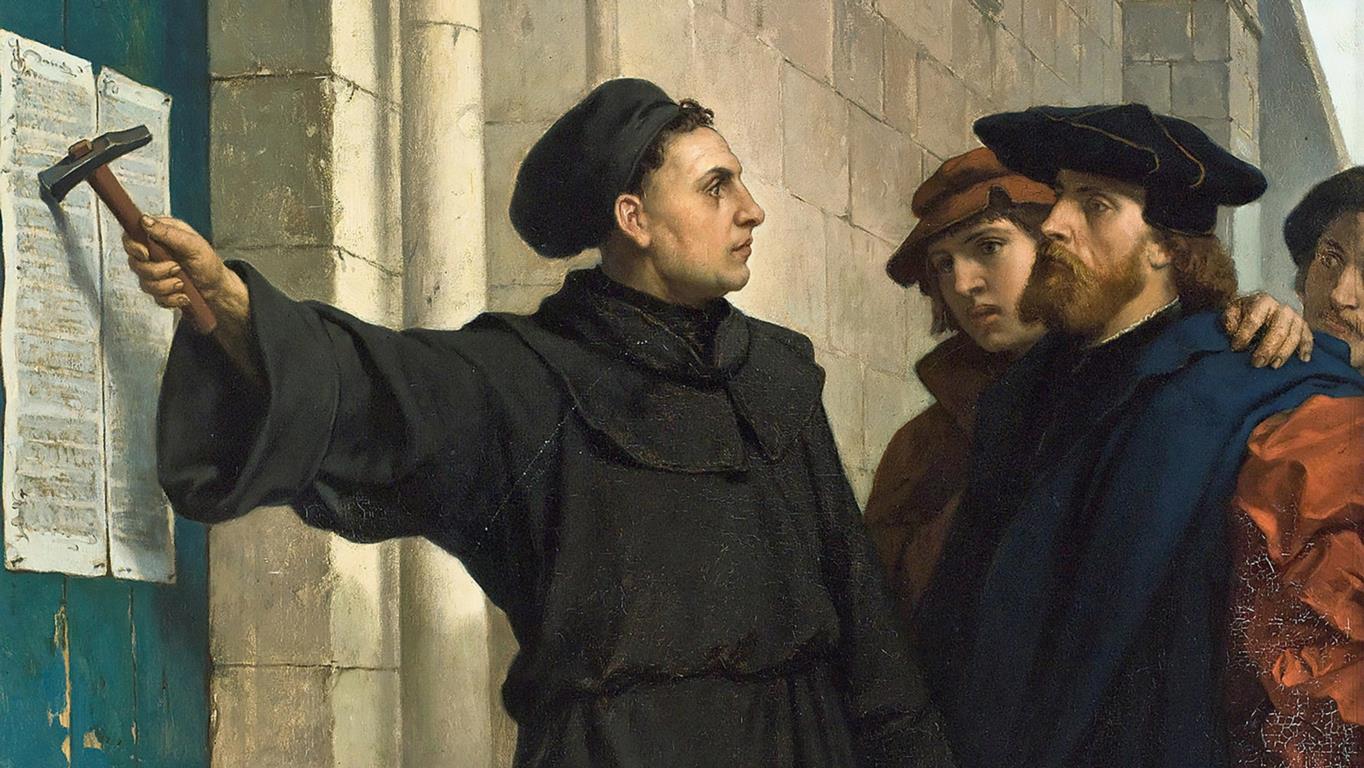
For in the gospel a righteousness from God is revealed, a righteousness that is by faith from first to last, just as it is written: "The righteous will live by faith" (Romans 1:17).
Each year when the neighborhood children come to our door in their Hallowe’en celebration, I think of Martin Luther and the spiritual/cultural revolution of which he was a significant player.
That’s because October 31st is recognized as the anniversary
date of the beginning of Protestant Reformation.
Here’s why.
Brother Martin, an Augustine monk, was increasingly
distressed about what he observed in the church at Rome: the tolerating of clerical
abuses; the crass sale of indulgences thought to expedite the passage of loved
ones from purgatory; the power and excessive wealth of the pope; and what
Luther saw as an accelerated drift away from the authority of Scripture.
Many of these issues grew as greater irritants in subsequent years, but Luther put pen to paper to raise awareness for the hallowed eve (Hallowe’en) of All Saints Day, celebrated on November 1.
Consequently, his dissatisfaction crossed the line from
frustration to action on the final day of October 1517, now seen as the seminal
launch-date of the Reformation.
His form of protest was to nail his document – Ninety-Five Theses containing his observations critical of the pope and RC church practice – to the door of the Castle Church in Wittenberg, Saxony (modern day Germany).
In that culture, the wooden church door was akin to a public
bulletin board.
But the people were ready for change.
And in an astounding example of 16th century “social media”, Luther’s document had been translated from Latin to German, printed mechanically, and circulated throughout Germany within 2 weeks. It was the topic of discussion in every pub in the land.
By the end of 30 days, it was being read all over Europe.
And in so doing, he unleashed a torrent whose theological,
social and political effects continue to be felt throughout the western world over
500 years later.
Luther was a scholar, a champion rebel-leader, a linguist, a political reformer, and a powerful preacher-theologian – but I most admire that he was used of the Lord to recover the Gospel of Christ in an era of profound spiritual darkness.
Here’s what we need to understand as part of our Gospel worldview.
The objective cause of our salvation is the Person
and work of the Lord Jesus Christ; on that Rome and the Reformers agreed.
However, deep division and passionate – at times wrathfully violent – disagreement rested on what theologians refer to as the subjective
dimension.
In other words, the instrumental cause: how do we receive or appropriate the Gospel’s spiritual benefits and promised eternal life?? How are the benefits of Christ’s work applied to my sinful life or yours? How does one begin a forever relationship with Almighty God?
The
RC church believed that these benefits accrued by way of the sacraments. There
were 7 such rites of which baptism and penance were key.
But
the Reformers pushed back with the cry of sola Scriptura. Scripture is
our only, the sole authority in matters of the Gospel. Unless our understanding
of the Gospel can be supported by biblical truth, then tradition and papal
assertions are meaningless to it.
And,
somewhat ironically, the Word of God led Luther and the Reformers to the book
of Romans.
The righteous will live by faith from the first
chapter was the crux of salvation – to obtain it and to live it out.
In his theological magnum opus, the Apostle Paul
continues: But now a righteousness from God, apart from law, has been made
known, to which the Law and the Prophets testify. This righteousness from God
comes through faith in Jesus Christ to all who believe. There is no difference,
for all have sinned and fall short of the glory of God, and are justified
freely by his grace through the redemption that came by Christ Jesus (Romans
3:21-24).
Luther and the Reformers were committed to the premise that God’s Gospel is predicated only and always on the Lord Jesus as revealed in the Scripture, given us by the Holy Spirit.
The Gospel of the 16th century had been
obscured by evolving traditions, political maneuverings, the lust for power and
wealth, and a suppression of biblical truth.
Luther helped to recover Gospel truth, Gospel simplicity,
and Gospel clarity.
Takeaway: The Gospel is the proclamation of the
good news,
of the
Person and work of Christ,
and the
eternal benefit to anyone responding to Him in repentant FAITH!
~ my thinking on the Reformation has been assisted by RC Sproul’s lecture, What
is the Gospel?, Renewing Your Mind podcast, Ligonier.org
and by The
Legacy of Luther, a series of essays edited by RC Sproul and Stephen J Nichols
graphic by
faithstrongtoday.com